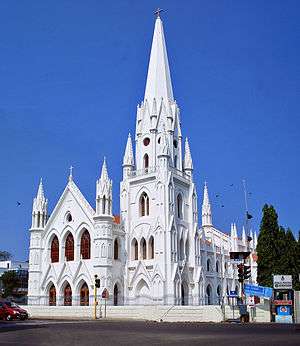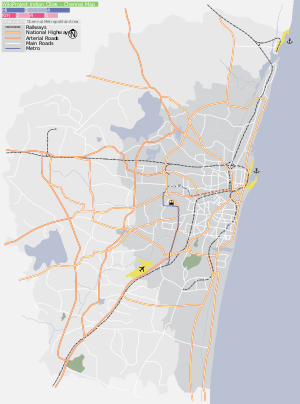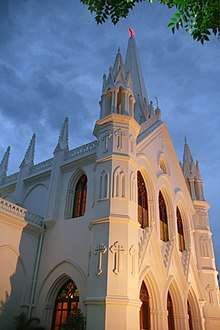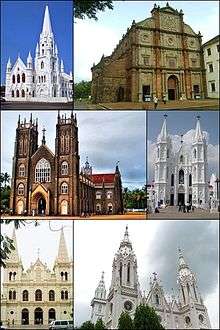St. Thomas Cathedral Basilica, Chennai
| St. Thomas Basilica | |
|---|---|
| Basilica of the National Shrine of St.Thomas | |
 San Thome Basilica | |
 St. Thomas Basilica Location within Chennai | |
| 13°2′1″N 80°16′40″E / 13.03361°N 80.27778°ECoordinates: 13°2′1″N 80°16′40″E / 13.03361°N 80.27778°E | |
| Location | Chennai, Tamil Nadu |
| Country | India |
| Denomination | Roman Catholic (Latin Rite) |
| Website | www.santhomechurch.com |
| History | |
| Former name(s) | San Thome Church |
| Authorising papal bull | 16 March 1956 |
| Status | Minor Basilica[1] |
| Dedication | St. Thomas |
| Relics held | Bone of St. Thomas |
| Architecture | |
| Functional status | Active |
| Heritage designation | National Shrine[2] |
| Designated | 7 February 2006 |
| Style | Neo-Gothic |
| Completed | 1523 (Current building 1896) |
| Specifications | |
| Length | 64 metres (210 ft) |
| Width | 12.2 metres (40 ft) |
| Nave width | 10 metres (33 ft) |
| Spire height | 47.2 metres (155 ft) |
| Clergy | |
| Archbishop | Abp. George Antonysamy |
San Thome Basilica is a Roman Catholic (Latin Rite) minor basilica in Santhome, in the city of Chennai (Madras), India. It was built in the 16th century by Portuguese explorers, over the tomb of Saint Thomas, one of the twelve apostles of Jesus. In 1893, it was rebuilt as a church with the status of a cathedral by the British. The British version still stands today. It was designed in Neo-Gothic style, favoured by British architects in the late 19th century. This church is one of the only three known churches in the world built over the tomb of an apostle of Jesus, the other two being St. Peter's Basilica in Vatican City and Santiago de Compostela Cathedral in Galicia, Spain.
History
According to legend St Thomas, one of the twelve disciples of Jesus, arrived at Muziris in present-day Kerala state in India from the Roman province of Judea in A.D. 52 and preached between A.D. 52 and A.D 72, when he was martyred on St. Thomas Mount.[1]
It is claimed that St. Thomas’s apostolic ministry in India took place specifically at Cranganore along the Malabar coast from 52 A.D to 68 A.D. His journey through Kerala is said to have resulted in numerous conversions. After spending 10 years on the Malabar coast he is said to have travelled Eastwards across the Deccan Plateau, arriving in Mylapore in 68 A.D. The cave at little mount is claimed to be his favourite preaching spot. A 2000 year old never drying, a miraculous stream of water on a rock face are said to be examples of the apostle’s divine exploits. A church atop St. Thomas mount was built by Portuguese in 1547 to mark the spot. It was on this St. Thomas Mount that the apostle was said to be killed by a lance which pierced through his back.
His mortal remains were believed to be buried in the location over which the present day Santhomes Cathedral Basilica stands. Sometime in the 10th century A.D a group of Nestorian Christians from Persia founded the Christian village of San Thomes and proceeded to build a church over the burial site of St. Thomas. This structure fell to ruins between 14th and 15th century. In 1522 the Portuguese moved the apostle’s remains to a new tomb and church which attained the status of Cathedral in 1606.
Pope Pius XII honored the Cathedral Church of the Archdiocese of Madras - Mylapore raising it to the rank of Minor Basilica by apostolic brief dated 16th March 1956. Massive followings and the immense devotion of people to a very ancient image of the Blessed Virgin also known as “Our Lady of Mylapore” was among the motives that prompted the Pope to bestow this honour.
There was 118 years of insecurity and uncertainty from the time the Golconda’s occupied San Thome in 1662 to 1780. No considerable changes happened to the original structure of the church built in 1523. It was only in 1893 that his Excellency Dom Henrique Jose Reed da Silva, Bishop of Mylapore resolved to build a new church with the tomb of the apostle in the centre. The second small tower in the centre of the existing cathedral points to the exact place where the apostle was buried. The present Gothic style church was completed in 1896 and duly consecrated by Rt. Rev. Dom Henrique Jose Reed da Silva, the first Bishop of the diocese. In 1956 the church was elevated to the status of a Minor Basilica.[3]
San Thome Basilica is the principal church of the Roman Catholic Archdiocese of Madras and Mylapore. In 1956, Pope Pius XII raised the church to the status of a Basilica Minor, and on 11 February 2006, it was declared a national shrine by the Catholic Bishops' Conference of India. The San Thome Basilica is a pilgrimage centre for Christians in India. The church also has an attached museum.[1]
Gallery
- The tomb of St. Thomas the Apostle
- Main altar at San Thome Church
- Mother Mary at San Thome Church
- Jesus Christ at main altar in San Thome Church
- San Thome Church
 Marian grotto at San Thome Basilica
Marian grotto at San Thome Basilica Evening view of the basilica
Evening view of the basilica San Thome Basilica, c. 1905
San Thome Basilica, c. 1905 Interior view of the basilica (before renovation)
Interior view of the basilica (before renovation) The nave of the basilica
The nave of the basilica Interior from main entrance
Interior from main entrance Lily pond at San Thome Basilica
Lily pond at San Thome Basilica San Thome Basilica
San Thome Basilica Inside the basilica - Main Prayer Hall
Inside the basilica - Main Prayer Hall San Thome Basilica - Lateral View
San Thome Basilica - Lateral View Altair of San Thome Basilica, Chennai
Altair of San Thome Basilica, Chennai San Thome Basilica in Monochrome
San Thome Basilica in Monochrome
See also
References
- 1 2 3 "Basilica of the National Shrine of St.Thomas". SanThomeChurch.com. Retrieved 20 February 2010.
- ↑ National Shrine Status Archived 27 February 2009 at the Wayback Machine.
- ↑ "Basilica of the National Shrine of St.Thomas". SanThomeChurch.com. Retrieved 27 January 2017.
External links
| Wikimedia Commons has media related to San Thome Basilica, Chennai. |
